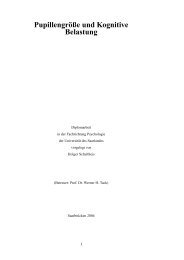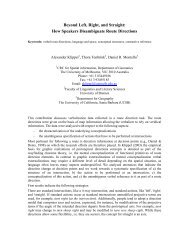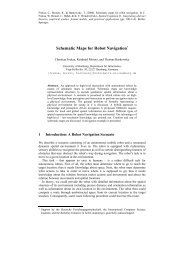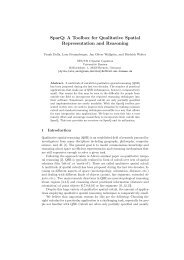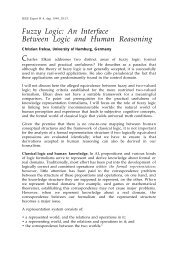Soar Tutorial - the Cognitive Systems Group
Soar Tutorial - the Cognitive Systems Group
Soar Tutorial - the Cognitive Systems Group
Create successful ePaper yourself
Turn your PDF publications into a flip-book with our unique Google optimized e-Paper software.
28<br />
4.5 Water Jug State Elaboration<br />
The initialization operator creates jugs that include <strong>the</strong> volume and content. As mentioned earlier, it will be<br />
useful for each jug to include <strong>the</strong> amount of additional water that can be added to it before it is full.<br />
Although this could be created by <strong>the</strong> initialization operator, it would have to be maintained by every<br />
operator application and that would make <strong>the</strong> operator application rules more complex. An alternative is<br />
to compute <strong>the</strong> available volume for each jug in <strong>the</strong> state with a separate rule. This rule will test <strong>the</strong> state<br />
and create a new structure on <strong>the</strong> state. This type of rule is called a state elaboration rule. State<br />
elaboration rules are ubiquitous in large <strong>Soar</strong> systems because <strong>the</strong>y can create useful abstractions of<br />
combinations of o<strong>the</strong>r working memory elements and represent <strong>the</strong>m directly on <strong>the</strong> state as a new<br />
augmentation. These new augmentations can <strong>the</strong>n be tested in o<strong>the</strong>r rules in place of complex<br />
combinations of conditions, simplifying rules and making <strong>the</strong> structures in working memory more<br />
meaningful. A critical aspect of state elaboration rules is that <strong>the</strong>y create i-supported working memory<br />
elements so that when <strong>the</strong> parts of <strong>the</strong> state <strong>the</strong>y test change, <strong>the</strong>y recompute <strong>the</strong>ir actions automatically.<br />
For <strong>the</strong> Water Jug problem, <strong>the</strong> state elaboration will compute <strong>the</strong> amount of empty space in a jug:<br />
waterjug*elaborate*empty<br />
If <strong>the</strong> state is named waterjug and a jug can hold volume v and currently has<br />
contents c, <strong>the</strong>n add that it has v – c available (empty) space.<br />
The first condition that it tests is that <strong>the</strong> state is named water-jug, so that it will only apply for water-jug<br />
problems. This test will be included in all of <strong>the</strong> water jug rules. It <strong>the</strong>n tests that <strong>the</strong>re is a jug and adds<br />
an appropriate empty attribute. Translating <strong>the</strong> conditions of this rule to <strong>Soar</strong> is straightforward. We have<br />
to include conditions for <strong>the</strong> jug, its volume and its contents.<br />
The action requires adding a new attribute to <strong>the</strong> jug (thus using <strong>the</strong> same variable as matched in <strong>the</strong><br />
condition, ) and <strong>the</strong>n computing <strong>the</strong> value by doing some math. In <strong>Soar</strong>, all math is done using prefix<br />
notation where <strong>the</strong> math operations (+, -, *, /) come before <strong>the</strong> arguments, with paren<strong>the</strong>ses surrounding<br />
<strong>the</strong> computation. For example, if <strong>the</strong> value was going to be <strong>the</strong> sum of and , you would put (+<br />
) where <strong>the</strong> value should be (right after <strong>the</strong> ^empty attribute). You can nest operations using<br />
additional paren<strong>the</strong>ses, such as (+ 2 (* )) to add 2 to <strong>the</strong> product of and , but for<br />
this case, nesting is not necessary. See if you can write <strong>the</strong> rule yourself before looking below:<br />
sp {waterjug*elaborate*empty<br />
(state ^name waterjug<br />
^jug )<br />
( ^volume <br />
^contents )<br />
><br />
( ^empty ( ))}<br />
When <strong>the</strong> contents of a jug changes through an operator application rule, this rule will retract <strong>the</strong> old<br />
value of ^empty and fire to compute a new value.<br />
Visual<strong>Soar</strong> – This rule is an elaboration. Visual<strong>Soar</strong> has a folder named elaborations in <strong>the</strong> operator<br />
window to hold files for state elaborations. Right-click on this folder and click “Add a File…”. You will see a<br />
text box pop-up. In <strong>the</strong> Name category type “empty” and click OK. Expand <strong>the</strong> elaborations folder and you<br />
should see <strong>the</strong> file you just created and two default files named “_all” and “top-state.” These files are<br />
provided for all <strong>Soar</strong> programs and have a few simple rules that are useful for tasks with substates. You<br />
should now open <strong>the</strong> “empty” file by double clicking on it. You can add <strong>the</strong> rule from scratch and just type<br />
it in, or you can use a template. To use a template, click on Insert Template in <strong>the</strong> toolbar and select<br />
elaborate-state. That will give you <strong>the</strong> basic structure of an elaboration rule. Just as before, check your<br />
file against <strong>the</strong> Datamap.<br />
<strong>Soar</strong> <strong>Tutorial</strong><br />
The value for this augmentation is <strong>the</strong><br />
result of <strong>the</strong> subtraction.



